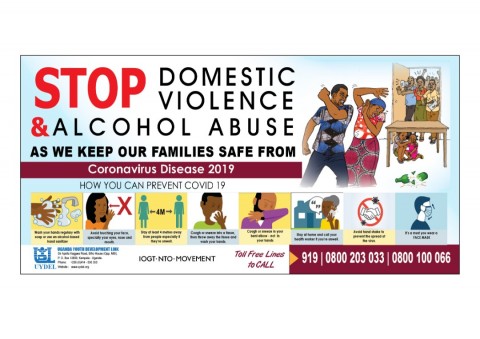
UGANDA YOUTH DEVELOPMENT LINK
PRESS RELEASE
RE: Alcohol and COVID-19; Two pandemics colliding
Introduction:
In Uganda we have seen a spike and unprecedented levels of drinking leading to increase in domestic violence and addiction levels. Some men are spending more time drinking and hence diverting money meant for food to buying alcohol.
Facts about alcohol in relation to COVID 19
a) Consuming high-strength alcohol does not kill the COVID-19 virus. If adulterated with methanol, can result in severe health consequences, including death.
b) Alcohol is not a food stuff
c) Alcohol is not an essential commodity
Alcohol use is related to COVID 19 in the following ways;
1. There are high chances that some bars and pubs may be operating illegally as they currently yearn for customers to buy alcohol despite the fact that they have been prohibited by government not to operate. This is recipe for the spread of the COVID 19 because there is a likelihood of close contact with patrons without observing social distancing.
2. There have been reported cases of domestic violence which is partly attributable to drunk husbands beating their wives during this crisis situation.
3. Drinking alcohol weakens the immune system and increases the risk of adverse health outcomes which makes it difficult for the body to fight infections like COVID 19.
4. Drinking alcohol affects one’s ability to make sensible choices or decisions to protect oneself from COVID 19.
5. Increased alcohol use among the community members as they try to deal with unemployment, stress, and loneliness during the lock down.
There are other ways to deal with stress without drinking alcohol.
Restricting Alcohol Access during the COVID-19 pandemic
The Uganda Government has issued a variety of “stay at home” orders, nearly all of which ban on-premise food or alcohol consumption and the subsequent closure of bars and restaurants to patrons. These unforeseen and new challenges have led to new approaches to alcohol sales in many areas, including alcohol delivery through food service apps.
We have seen social media platforms that are promoting online adverts from one of the big alcohol industries in Uganda encouraging the population living in Kampala and Wakiso to visit a website and place an order which would be delivered to the respective patron in line with government movement directives. We condemn these acts in the strongest terms possible.
The Alcohol Industry should not reap from the people especially at this time when people should spend wisely the little they have since the economy is slow now. This is a time to promote healthy behavioural changes; people should stay home sober with their families to avoid likely consequences of alcohol use.
The general population should be reminded to observe the following;
a) Parents/guardians should be role models to their children and young people by making sure they do not have access to alcohol. Parents should talk to them about why drinking affects
behaviours that can expose you more to the virus.
b) People should stay calm without alcohol. Fear and anxiety are common during the
pandemic. Alcohol only makes them worse. Do not drink alcohol to cope with your
emotions.
c) People should be resilient without alcohol. Drinking alcohol during home isolation increases
the risk of violence and injury.
We therefore appeal to;
1. Government to regulate and impose a complete ban on the distribution, transportation and sale of any liquor and alcohol in any form during this 21-day COVID 19 lock down. Many young people and men are resorting to drinking liquor in homes and urban centers in big groups which compromises social distancing. This is a factor that needs urgent and timely attention.
2. Government should institute another taskforce to support affected communities by providing psychosocial support, and counselling services to cope, adjust and adapt with the current situation.
3. Media programmes need to focus on building and communicating hope, adaptation to the current situation, recovery and successful outcomes post COVID 19 lock down. Less time should be allocated to issues of hopelessness, unemployment, stress and trauma.
4. The COVID 19 prevention messages should be complemented by communicating with the public about the risks of alcohol consumption, and maintaining and strengthening alcohol and drug rehabilitation services.
Signed,
Rogers Kasirye
Executive Director
For further details you may visit www.uydel.org
